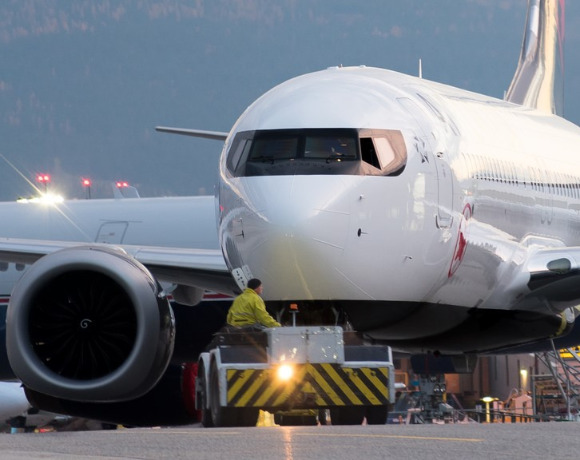in Lessors & Asset managers , ESG & Regulation , Aviation Banks and Lenders
Tuesday 12 March 2019
FAA deems MAXs “airworthy” as the rest of the world bans flights

The number of aviation authorities around the world banning 737 MAX flights continues to grow as the US Federal Aviation Administration (FAA) issues a “continued airworthiness notification” for the aircraft involved in the Ethiopian Airlines crash.
On Tuesday, the European Union Aviation Safety Agency (EASA) was the latest to join an increasing list of countries to announce a ban, suspending all 737 MAX flight operations in Europe. The Ethiopian crash is the second involving a newly-delivered 737 MAX: a Lion Air aircraft (MSN 43000) on lease from CMIG Leasing went down twelve minutes after departing on 29th October last year. Both crashes occurred minutes after take-off with no survivors.
The FAA wrote that although “external reports are drawing similarities” between the two crashes, “this investigation has just begun and to date we have not been provided data to draw any conclusions or take any actions,” adding that a review demonstrated "no systemic performance issues" and that there is no basis for grounding the aircraft.
Boeing has stated it still has “full confidence” in the aircraft type despite the 737 MAX having been banned from airspace or grounded in the EU and an additional fourteen countries in two days. The list of countries that have placed bans on 737 MAXs includes China, Indonesia, Ethiopia, South Korea, Singapore, Australia, Oman, Malaysia, United Kingdom, Germany, Ireland, France and New Zealand as of 12th March. There are approximately 356 737 MAXs operated worldwide by 59 airlines.
Boeing and the FAA’s software update
Boeing, in a statement expressing its “deepest condolences”, said that it has “full confidence in the safety of the MAX” and has no basis to issue new guidance to operators. Boeing said it has been developing software updates to the 737 MAX “for several months”, including to the Manoeuvring Characteristics Augmentation System (MCAS). MCAS, which is a new piece of software on 737 MAX 8s and 9s, forces the aircraft’s nose down when sensor data indicates that there is a possibility that the aircraft will stall.
The MCAS on the Lion Air 737 MAX that crashed might have responded to incorrect flight data, according to a preliminary report on the accident by Indonesia’s National Transportation Safety Committee in November. The report, however, did not state any definite conclusion as to why the aircraft went down.
Boeing said the software update would “[incorporate] angle of attack (AOA) inputs, [limit] stabilizer trim commands in response to an erroneous angle of attack reading, and [provide] a limit to the stabilizer command in order to retain elevator authority.” The OEM added that it had been working with the FFA to the develop the software update and that it would be deployed across the 737 MAX fleet “in the coming weeks.” The FFA said it would mandate “design changes” for the 737 MAX by April.
The FAA last issued an Airworthiness Directive for the 737 MAX on 7th November 2018, one month after the Lion Air crash. 74 in-service 737 MAXs are registered in the United States.
Lessor chiefs refuse to speculate on crash
A panel of lessor CEOs from SMBC Aviation Capital, GECAS, CDB Aviation, and Air Lease Corporation expressed their sympathy for the victims of the tragedy but refused to speculate on what may have caused the crash. Peter Barrett, SMBC Aviation Capital’s CEO, described the crash as a “terrible tragedy”. He added that it was “too early to speculate” on the causes of the crash. “Let’s see how the information and data comes out over the next couple of weeks and we will take it from there.”
Alec Burger, President and CEO of GECAS, expressed his support for Boeing but also declined to speculate on how the crash may affect the aviation finance industry. “Boeing will always be a very important partner of ours and we wish them the best. We are going to be as supportive in any way we possibly can, but it’s just too early to speculate as to what the effects could be.”
The Ishka View
The FAA is likely to decide this week whether it will ground the aircraft or not. Despite the FAA's endorsement of the aircraft type, a growing list of civil aviation authorities have grounded the aircraft and a global grounding is already happening by default As Ishka goes to press only nine carriers are currently operating 737 MAX aircraft in the US, Canada, Panama, Kazakhstan and Thailand. Boeing states it has “full confidence” in the asset type but it cannot easily give further reassurance before a full investigation is concluded.
Aviation financiers and lessors are remaining tight-lipped publicly about the potential consequence of the MAX crash until more details are known. Most of the largest lessors are investors in the aircraft with significant orderbooks. Unless there are some quick answers and solutions from Boeing the MAX groundings are likely to have a profound impact across the aviation finance industry. In the short-term lessors remain unaffected because most airlines will be forced to honour their MAX leases, even if they cannot legally operate the aircraft. In the medium-term, the bans place a considerable and unexpected financial burden on MAX operators while for Boeing, the crash represents arguably the biggest public relations crisis it has ever faced.




Sign in to post a comment. If you don't have an account register here.